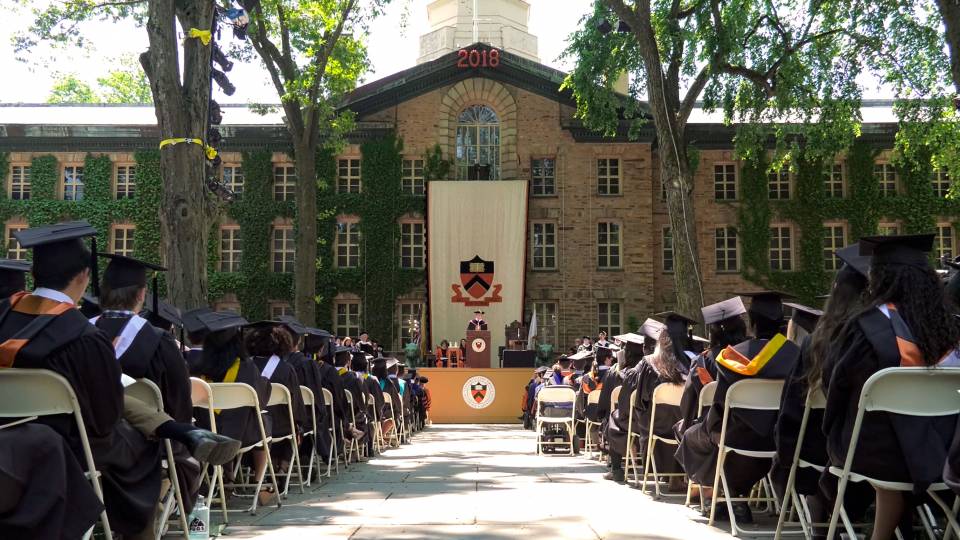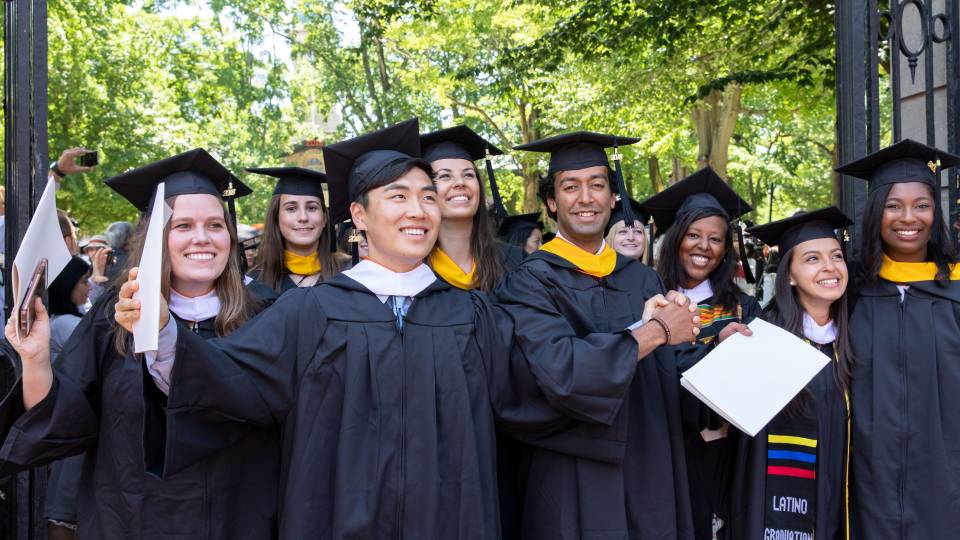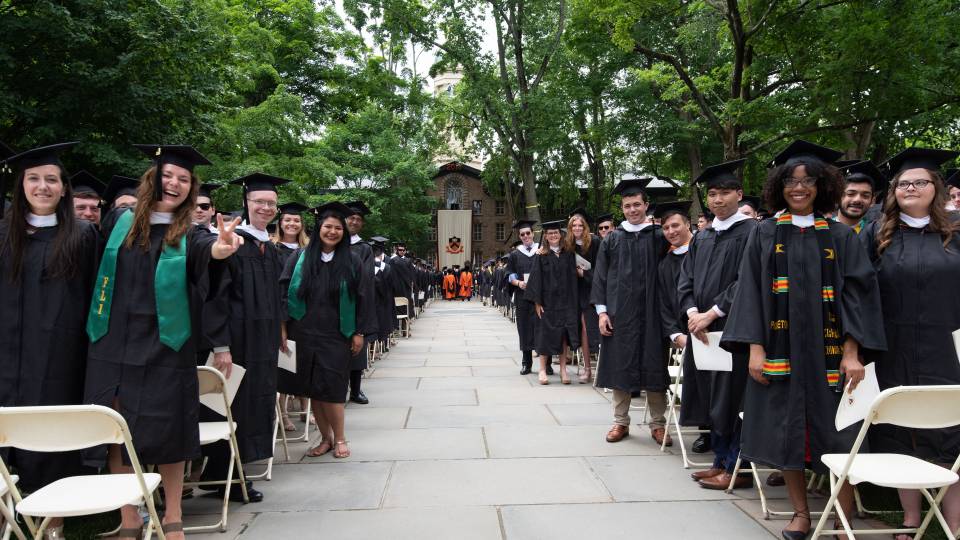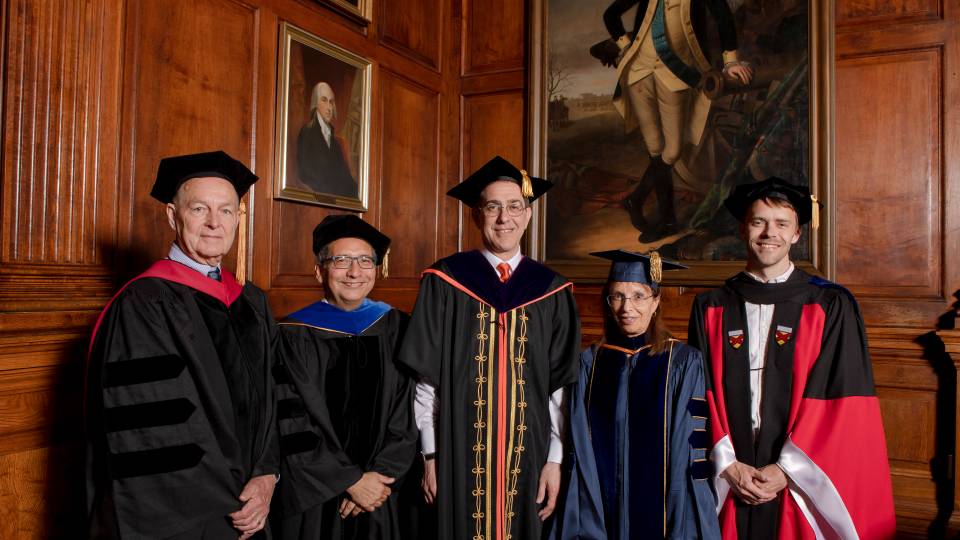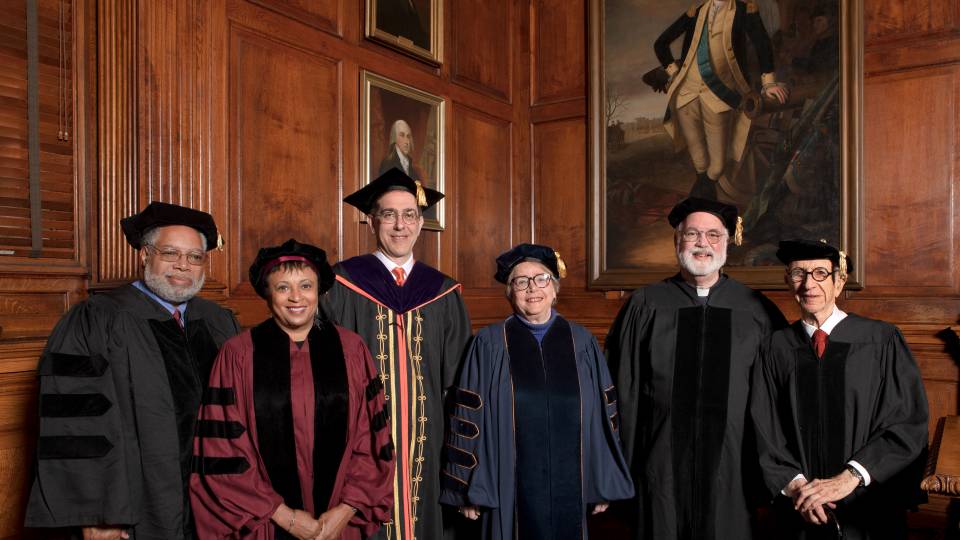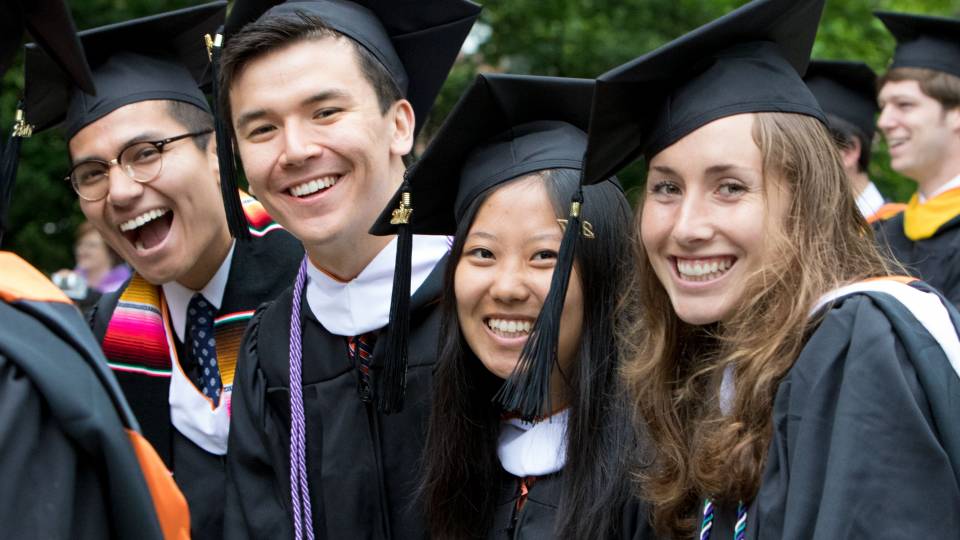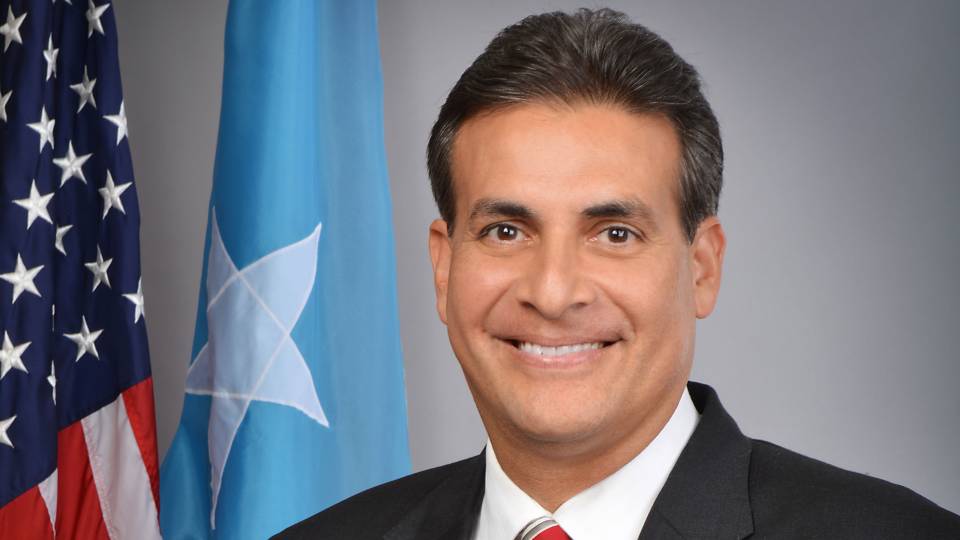—Remarks as prepared—
Buenas tardes. Good afternoon, great Princeton Class of 2018! Thank you for having me here. Thank you President Eisgruber, Trustees, Faculty, parents, family members and friends. As I walked in, I remembered 36 years ago when I entered this Chapel for the first time. President Bill Bowen and many mentors, especially Arcadio Diaz Quiñones: thank you for your lessons and inspiration.
I am a member of the great Class of 1986, and the second member of my class to speak at a Baccalaureate ceremony. Both of us are featured on page 62 of our '86 yearbook, the Nassau Herald, just one next to the other. We were both members of Quad Club and friends. He was really into computers… At our 10th reunion, after many beers, he was talking about using the emerging internet to sell books, and we all thought he was nuts! Well you all know what happened… He is now the wealthiest man in the world, and I am not. I believe Jeff Bezos’ Amazon is doing quite well. So, my first advice to you is always attend reunions and have as many beers as you did last night, but invest early in your classmates’ crazy ideas!
I am here to talk to you about public service.
So, where should I start? Oh, yes…
I pledge my honor that I have not violated the Honor Code during the preparation of these remarks!
Since the late 19th century those words have been an integral part of Princeton. Allow me to put them in context. Archivist April Armstrong has documented that cheating ran rampant at Princeton at the time. Students saw it as a way to outwit the faculty, while professors spent a great deal of energy trying to catch cheaters. But something big happened: student dissatisfaction with that conduct of dishonesty and “sly warfare” peaked in 1893. Back then, the most influential seniors said enough is enough, and proposed an honor pledge “to elevate the standard of college morality.”
What do I love about that story?
Our Honor Code was not imposed on students. The leadership, courage and vision came from the Senior class. And they succeeded. Here we are, 125 years later still embracing those words. It is a three-step profound code:
First: a personal commitment to integrity, and high standards of behavior.
Second, a commitment to hold others accountable to a high standard of integrity.
And third, it’s a story about having the courage to act.
You are about to depart Princeton. Believe me, in the polarized political and social environment of 2018, those words are more important than ever. They represent a commitment, a promise, and a responsibility to confront an old and dangerous disease that has destroyed many nations and societies in the past; a disease that is making its return with a vengeance: the culture of institutional lies; what is now called “alternative facts.”
II.
I decided many years ago that public service was the vehicle to help right what I believe is so wrong in America and in Puerto Rico. Allow me to share with you my own rollercoaster life in politics, law and public service over the past 30 years going back and forth between different worlds; from the beautiful island of Puerto Rico, to the complexities of Washington D.C.; from many states of the Union, to countries in Latin America.
I am the son of Carmen. A “wise Latina” born and raised in Puerto Rico, my mother attended college in Massachusetts in the 1950’s at a time of profound racism in America. I am also the son of Mohinder, an Indian man, a Punjabi Sikh from Mirpur, in northern India. His parents, siblings and entire village were massacred in 1947 by Muslim troops during the cruel partition war between emerging Pakistan and India. But despite their painful experiences, and far from the hostility, hate and resentment that they could have very well borne, I grew up in a home full of love, tolerance and inclusion. My parents taught me to speak up for those who don't have a voice and to love al prójimo, love thy neighbor.
Before I was born, my mother and father briefly lived in Washington, D.C. On August 28, 1963, they joined thousands on the Washington Mall to listen to a young African American by the name of Martin Luther King. That passionate "I have a dream" speech is one of the most forceful, persuasive and inspiring acts of defiance of a young generation trying to instill honor and integrity in this country's history. A simple, yet compelling principle: what matters is the content of our character; not the color of our skin.
It frightens me that more than 50 years later, the opposite notion seems to be resurging in today's United States.
I was born in El Salvador in May 1964, do the math -- exactly nine months after Dr. King’s speech. Apparently, my parents took to the next level Dr. King’s admonition that “this is no time to engage in the luxury of cooling off.”
My parents had moved to El Salvador to work at the US Embassy in a project to fight poverty in Central America, as part of President Kennedy’s Alliance for Progress. So, I am a proud Puerto Rican, conceived in Washington, D.C., born in El Salvador, with an Indian father, a Puerto Rican mother and married to a wonderful woman from Panama. Imagine how much fun I have filling out the census form!
After Princeton, I spent a year in Chile. It was 1986, and General Pinochet’s cruel and repressive dictatorship, based on deceit, lying about the principles of democracy and a well-orchestrated state system to manipulate public facts was in full force. I worked part time with the Vicaría de la Solidaridad, a Catholic Church effort to record human rights violations. I also participated for a year on an effort to collect pamphlets and underground materials; a project conceived here in Princeton by Professor Stanley Stein, his wife Barbara and led then by Bibliographer Peter Johnson. In what is called today the Ephemera Collection in Firestone Library, Princeton is the only institution in the world to have documented and preserved decades of struggles of people whose lives were being shattered.
The consequences of a government based on dishonesty in Chile were devastating: people were desperately trying to decry human rights violations; people were afraid to be visible, but absolutely needing to denounce the atrocities being committed. Today, I salute Professor Stein, Peter Johnson and Princeton University for the outstanding work preserving these vital voices of Latin America during that period.
The greatest lesson I took from Chile is the humanitarian cost that nations and people pay when the lack of democratic consensus leads to dangerous authoritarian governments.
Fast forward 32 years. An emerging and troublesome climate of democracy and distrust seems to be brewing right here in the United States. It is a very simple concept: you cannot have a democratic form of government if citizens distrust each other and if dishonesty is a form of life.
Believe me, what is happening is not good. Political discourse is losing contact with reality. When we let public speech be dominated by discrimination, factionalism, fanaticism, authoritarianism, demonizing the other, cult of personality, religious intolerance … the consequences are nefarious. As my father learned firsthand in India; as so many of our ancestors painfully learned, whether in Weimar’s Germany, Mao’s China or even in Chile.
I don't know about you, but I am starting to hear too much of the same poisonous rhetoric that lead in the past to heinous consequences. This public discourse based on so much information that is simply not true, makes me question whether government of the people, by the people and for the people may actually perish if we don’t do something about it.
I see it every day in my work in Puerto Rico.
Puerto Rico filed for bankruptcy in 2017, and has been in an economic depression for the past 12 years stemming from decades of deceit and dishonesty by Wall Street and multiple irresponsible fiscal and tax policy decisions by both the government of the island and the federal government in Washington, D.C. We are now seeing the enormous consequences of bond rating fabrications, ignoring experts’ warnings and simply looking the other way when serious, verifiable data was available. Our citizens are now paying the price. Draconian austerity measures are being imposed as we speak, by the local government and an undemocratic oversight board imposed by Congress. Hundreds of thousands have left the island.
The lesson is loud and clear: lack of integrity has serious consequences.
And then disaster struck. On September 20th, 2017, we were devastated by Maria, the most powerful hurricane to make landfall over the island in over 100 years. We did not have energy or running water for months; there are some families still waiting. Up in the mountains, children died of leptospirosis after drinking contaminated water. The bureaucratic response by federal and state authorities was has been not only shameful but reprehensible and immoral. Many people were left to survive on their own. And mind you: Puerto Ricans have been United States citizens for over 100 years.
Some of us were frustrated and looking for ways to help. Without any knowledge of water filtration or plumbing, we bought over one hundred 500 gallon cisterns and thousands of portable water filters, borrowed a few trucks and spent three months installing them in churches, community centers and close to water springs. With our makeshift system, we were able to produce over 350,000 bottles of safe drinking water per day and save thousands of people from potential life-threatening stomach viruses. Let me thank one of your classmates Diego Negrón-Reichard, who put together a fundraiser last semester to help finance this effort. ¡GRACIAS DIEGO!
The New York Times reported back in November that instead of pledging support for a large-scale emergency relief plan, President Trump declared that Hurricane Maria was not a “real catastrophe” and complained that the storm had [and I quote]: “thrown our budget a little out of whack.” He announced in San Juan that the official death toll from the hurricane, allegedly 16 at the time, was the true measure of the government’s response. “We saved a lot of lives,” he boasted, and then flew back home. It was his way to scale back on emergency federal help and minimize the magnitude of the crisis. That was after tossing around paper towels during his visit to the island.
To this day the official death toll by the government of Puerto Rico is 64 deaths. Then truth kicked in just this past week: The New England Journal of Medicine published a shocking report last Tuesday by Harvard’s School of Public Health. It estimates that 4,645 people died after Hurricane Maria. The newly released study was conducted without the colaboration of Puerto Rico’s government, which the researchers said refused to provide data to them. A real catastrophe indeed that stems from government inaction, lying to the people, posturing, and being blind to reality: all symptoms of “alternative facts” and botched data by the governments of Puerto Rico and the United States.
Again, lack of integrity has real life consequences.
III.
So, what are we supposed to do?
In such an environment, we need to wake up and confront the culture of lies. There is no time to waste. The voices of reason; of honor, integrity and honesty need to be heard.
I know it is not easy. I returned to work in Puerto Rico convinced that state and local governments are the real laboratories of democracy. What I saw shocked me. Our public schools, where all poor children attend, for example, have one of the worst achievement performances in the United States. There are not enough books in the classrooms; thousands of teachers and students skip school every day. And no one said a thing! The government and the elite simply looked the other way. I have been pushing for radical reforms. To me, perpetuating poverty on the children of the Island is not an option.
On the other hand, I have taken on the task to condemn the culture at the Electric Utility, the most inefficient, financially bankrupt and expensive energy generation and distribution monopoly. Electricity is vital for progress in the 21st century. Just think how much sun we have on the island! And yet, 98% of our generation comes from burning fossil fuels; less than 1% is solar. We are hostages of an oil cartel of sorts. And yet, for decades the political leadership and the government of the island knew it but tolerated and even celebrated this culture of dishonesty and deceit.
In both cases, by saying enough is enough I have had to confront very angry interest groups. From the left and the right; conservatives and liberals. The world of false stories and alternative facts is not confined to one ideology.
In this climate of confusion, misinformation and lies, nothing is more powerful than the inconvenient truth of real facts, the strength of honor and the persistent sound of our voices.
But let me warn you: it can get very lonely out there in the wild forest of righting wrongs, and instilling honesty in public service.
So, graduating Seniors, how can you live up to the standard of Princeton in the Nation’s Service? My clear invitation is to fight the alternative facts disease wherever you are, wherever you go, before it is too late.
Like the Honor Code created by students 125 years ago, you need to follow three mantras:
First, democracy needs from you a commitment to personal integrity. Verify the sources of information, ask the hard questions, and educate others to do so. You have had the best education in the world, and your generation has more access to technology and social media than any other before you. That comes with a responsibility to spread the truth.
Second, you need to be brave and hold everyone else to your high standards. SPEAK UP PEOPLE, SPEAK UP, you have the tools to have a voice more powerful than any other generation.
And finally, you need to act and act quickly. As Woodrow Wilson once said, “Life does not consist in thinking; it consists in acting.”
Look around America today. There are fighters out there confronting the culture of lies and alternative facts; telling the truth and reporting violations of vital principles and values, just like Martin Luther King and other leaders of the civil rights movement did in the 1960’s. Choose your cause and make your honest argument.
Today, I salute the Black Lives Matter movement.
I salute the women all over the United States in the Me-Too movement.
I salute the students at Santa Fe High School in Texas; the Sandy Hook Elementary School in Connecticut; the Marjory Stoneman Douglas High School in Florida and so many others who have been victims not only of senseless school shootings but of senseless gun legislation.
I salute President Eisgruber and Harvard President Drew Faust who two weeks ago urged Congress to stop absurd deportations and provide legal status for people from El Salvador, Haiti, Honduras, Nepal, Nicaragua and Sudan.
I also salute the thousands of excellent Latino students in our colleges and universities fighting not to be deported; targets of the culture of prejudice.
But allow me also to salute my people of Puerto Rico. Against all odds, Puerto Ricans are up, fighting, resilient with a sense of purpose in finding opportunity amidst the crisis, with their hearts filled with hope and a renewed commitment to rebuild our island.
All these brave men and women are saying enough is enough with this culture of hostility, of confrontation and intimidation. And yes, of lies.
Put all of this together and it feels like 1893 again.
But this time around, YOU are the Senior Class. We urgently need you to foster a National Honor Code to stop this “alternative facts” disease that is weakening democracy. My hope is that at the Baccalaureate ceremony 125 years from now -in the year 2143- they will celebrate the great Class of 2018 whose members had the vision and the courage to take the moral leadership to do what was right for the world.
El silencio no es opcion.
Silence is not an option. Class of 2018, denounce what needs to be denounced; fix what is broken; right what is wrong and do not allow anyone, regardless of their agenda, to use false data and pretenses to confuse citizens and weaken democracy. Be the vital voices to restore democratic principles. Don’t look elsewhere. It is you: the great Class of 2018! Speak up, seniors, speak up! ¡Hablen, seniors, hablen!
Show the world what having honor is about; what an honor code is and how it works. You must become the generation to restore honor in America and the world.
There is nothing more honorable than making people have hope in democracy again.
You have the honor; go live it; go teach it; go act on it.
THANK YOU
